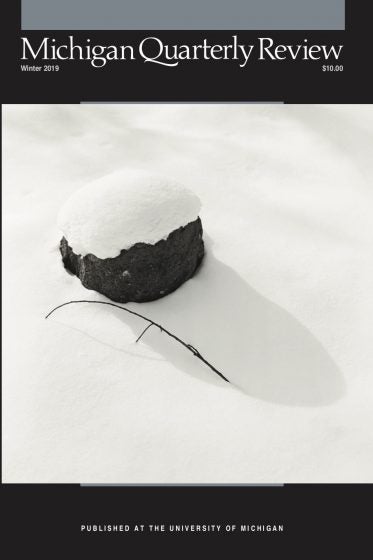“Tuta, Tuta,” by Onyinye Ihezukwu, appears in the Winter 2019 Issue of MQR.
Fanta, who is looking to buy a house, remembers something when she walks into this strange kitchen with yellow walls, low ceilings, double louver windows, and a sink deep enough to soak two days’ worth of used dishes. It’s a small memory of her at seven, at pretty Bene’s ninth birthday party. The entire street had turned out for the party, mainly to eat peppered jollof rice and stewed meat, with bottles of Coke for the children, malt and Guinness stout for the grown people. Then Bene’s sachet of fancy chocolates from an aunt in London vanished, just like that, causing Bene to cry so hard that the lace collar of her white taffeta dress was ruined.
The papas, mamas, aunties and uncles, along with neighborhood children old enough to understand the pain of having something so precious taken away from one on a special day, gathered around Bene to console her. The fat cake made by Ochi, the baker (best amongst bakers for fifty square kilometers), complete with a design of Bene’s name in pink and white icing, was still there in the center of the party table—but Bene wouldn’t look at it. The crates of soft drinks and toy whistles poked from underneath the tablecloth, but Bene didn’t want to know if they existed. Birthday cards, Jackson Five on the stereo, the street photographer’s shiny new camera— she ignored them all. It was her chocolates, the ones Aunt Selina sent from London, that totally broke her heart.
The chocolates were named Giant Buttons, as Fanta found out. They came in a shiny purple pack, with a drawing of two brown-white chocolate discs on the front. The discs looked straight at Fanta like surprised eyes as she tore open the pack with nippy teeth and snuck one heavenly piece into her mouth. She was hiding behind Bene’s mother’s kitchen door as she ate chocolate after chocolate, standing precariously on a pile of green plantains and yam tubers long as her forearm. Her unsteady perch caused the hem of her twill dress to peek beyond the door frame, while her shoulder remained flouncing in and out in busy twitches—all actions missed by her excited child’s mind. Sure enough, someone caught the strange movements behind the door—Fanta’s own mother, who had entered the kitchen in search of extra cutlery—and there was a moment of wide-eyed shock, fury, and the memory of how sweet could quickly turn to bitter in the synchronized bat of an eyelid between mother and daughter.
Her mother got the show on the road herself. She walked behind Fanta, nudging her on with two fingers between her little girl’s shoulder blades, up the passage leading to the center of the party room where Bene, still sniffling, was readying to blow out her birthday candles. Fanta’s mother said the candle blowing would have to wait because there was a new develop- ment. She signaled Bene’s papa to suspend his disc jockey work and turn down the Jackson Five, signaled the photographer to stop terrorizing the smaller children with his pointy-mouthed camera. For the sake of novelty, and also because they thought that clever Fanta had a special performance planned to spruce up Bene’s mood, everyone complied. They drew back, leaving Fanta a clear unrestricted circle. Even Fanta’s mother pulled back to give Fanta full spotlight advantage. She had seized the Giant Buttons and disappeared the pack in the folds of her maxi skirt to be revealed after Fanta made her confession.
Go on, her mother said to Fanta in the center of the circle. Tell them what you did.
Fanta’s face was to the floor, one cheek bulging from a still-melting piece of chocolate.
Is it a song, someone asked. Fanta’s mother said to the girl: they’re asking if it’s a song, what do you have to say? By then Fanta’s eyes were a milky mist, her heart as itchy as her school sweater. Her “show” voice, the performance voice she’d used with the children’s choir at Christmas time, and might have used again, curled up inside her like contours of burning paper, never to be restored for the rest of her childhood and through her teenage years, up to this late-twenties woman now standing in this unfamiliar kitchen with freshly painted yellow walls. For it was whilst inside that circle of shame and suddenly frightened by her impending confession, that Fanta forgot her little girl’s golden rule to count from one to ten till the black bird flew away. What came to her instead, as her eyes reflected blurry pictures, was the image of her papa revealed in the patterns of the floor tiles of the party room.
A few days earlier, her papa had arrived from work with a box containing a red-white kerosene stove, which he set on the table of their sitting room. It was a Butterfly model, bearing double burners and a silver control jack. It had a unique shape like a hut, with oval windows on all sides through which one could see the perforated cylinder channeling the wicks in vertical for- mations to the fuel tank at the base. The family—Fanta’s mother, Fanta, and Flowergirl the cat just delivered of four kittens—gathered around the stove to silently welcome it to its new home. Then papa had the gas stove and cylinder moved to the garage to make room for the Butterfly. Since gas cost thirty and kerosene twenty-eight and something, they had to stop using the more expensive one. A civil servant’s money does not grow on trees, her father liked to say. Tuta tuta, meaning pick it up, don’t waste anything….
Purchase MQR 57:5 or consider a one-year subscription, to read more. This story appears in the Winter 2019 Issue of MQR.








